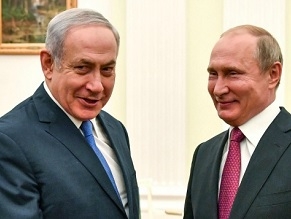|
Analytics

Russian President Vladimir Putin shakes hands with Israeli Prime Minister Benjamin Netanyahu during their meeting at the Kremlin in Moscow, Russia, July 11, 2018. Photo: Yuri Kadobnov / Pool via Reuters.
|
Month After Moscow Sit-Down, Israel’s Netanyahu, Russia’s Putin Discuss ‘Regional Issues’ in Phone Call
02.04.2019, Israel and the World Israeli Prime Minister Benjamin Netanyahu and Russian President Vladimir Putin spoke by telephone on Monday.
According to Netanyahu’s office, the two leaders talked about “regional issues.”
A Kremlin statement, reported by the Tass news agency, said they “discussed pressing bilateral issues, including military contacts, and the situation in the Middle East region.”
Netanyahu met with Putin in Moscow at the end of February.
Several days after that sit-down, the Israeli prime minister recounted for members of his cabinet, “The focus of our discussions was the Iranian issue. I made it unequivocally clear that Israel will not allow the military entrenchment of Iran in Syria, and I also made it unequivocally clear that we would continue to take military action against it.”
“We agreed on the continuation of the security coordination mechanism between the Russian military and the IDF,” Netanyahu continued. “President Putin and I also agreed on a common goal — the withdrawal of foreign forces that arrived in Syria after the outbreak of the civil war. We agreed to establish a joint team to advance this goal, together with other elements.”
Relations between Jerusalem and Moscow were clouded last year by a mid-September incident in which a Russian military plane was accidentally downed by a Syrian anti-aircraft missile over the Mediterranean Sea, near Latakia. Russia charged that Israel had indirectly caused the mishap by not providing enough advance warning of an IAF operation that was taking place in the area at the time.
Israel and Russia have sought to avoid such occurrences since Moscow’s military intervention in Syria on behalf of the Assad regime in the ongoing civil war in the country began in 2015.
Over the past few years, the Israeli military has acted numerous times in Syria to thwart Iran’s ambitions there — including the transfer of advanced weaponry to Hezbollah, the Tehran regime’s Lebanon-based Shi’a proxy.
Algemeiner
|
|
